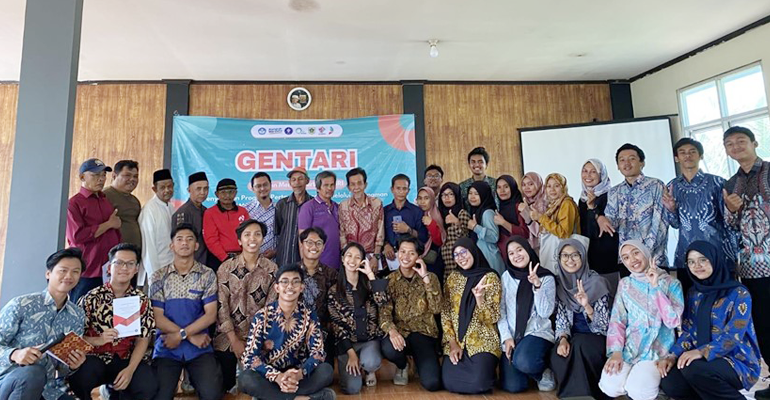PPK Ormawa BEM Fateta IPB University Introduces SRI Method Agriculture, Water-Saving and Low Emission Rice Cultivation

Currently, one of the contributors to greenhouse gas emissions comes from the agricultural sector. The excessive use of pesticides and chemical fertilizers is also one of the factors causing environmental degradation. Therefore, the agricultural sector is required to take adaptation and mitigation measures to climate crisis conditions in maintaining agricultural productivity.
Facing these challenges, the Student Executive Board of the Faculty of Agricultural Technology (BEM Fateta) of IPB University recently held a counseling program on organic farming through rice cultivation using the System of Rice Intensification (SRI) method. This activity was held at Cibitung Tengah Village Hall, Tenjolaya District, Bogor, West Java.
Wahab Chayyi as the team leader explained that this program is called GENTARI (Movement Towards SRI Agriculture) by targeting the Cibitung Tengah Village Farmer Group Association (Gapoktan). With the implementation of this program, it is expected to increase the agricultural productivity of the village without reducing the quality of the climate.
The activity presented Dr Chusnul Arif as a lecturer at IPB University as well as an expert on the SRI method. In his presentation, he explained that conventional rice cultivation produces quite high emissions which are characterized by rising temperatures. One of the efforts that can be made to reduce emissions without reducing rice productivity is by using the SRI method.
“The advantage of this method is that it uses fewer seeds and can increase production by 78 percent. Water savings can also be up to 40 percent and because the conditions are drier, methane gas or emissions can be reduced,” he said.
Dr Chusnul said there are six principles in applying the SRI method. First, the seeds are young so they only need 7-14 days and can cut seedling time. Second, the rice is planted with a wide spacing to give the plants and tillers room to grow. Third, one hole is planted with one plant.
Fourth, a more effective irrigation system using the intermittent method. Fifth, intensive weeding to reduce weeds while improving crop aeration. Sixth, using organic fertilizers and local microorganisms (MOL) to produce healthier products.
“In applying the SRI method, it requires more labor because we have to do frequent weeding,” he said. In addition, in the discussion session, Dr Chusnul explained that expensive fertilizer prices can be overcome by utilizing waste to make compost.
This counseling activity was attended by Hadiwijaya as the Head of Dusun 1 Cibitung Tengah Village, RT/RW administrators, Gapoktan, Kampung Ramah Lingkungan (KRL) administrators and local community representatives.
“I would like to thank you for choosing our village as a place to carry out GENTARI activities. We really hope for the arrival of students from IPB University, because this is related to agriculture. Cibitung Tengah Village still lacks farmers, even though rice is the staple food. This program is expected to provide knowledge on how to grow rice properly. Agriculture is important and hopefully agriculture in Indonesia will always be fertile,” said Hadiwijaya in his speech.
The counseling activity ended with the symbolic handover of organic fertilizer and SRI method guidebooks to the Head of the Cibitung Tengah Village Farmer Group. (*/Rz) (IAAS/Hap)



